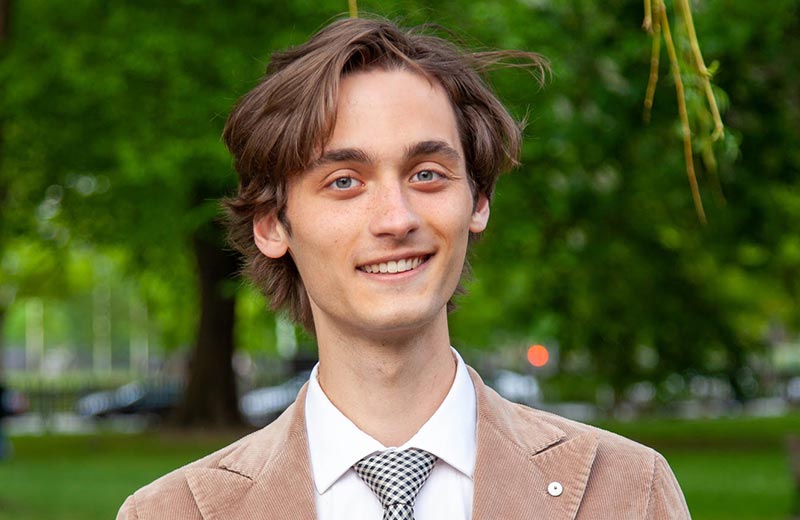Backed by Energy Department fellowship, Max Daniels looks to strengthen predictive algorithms
Author: Zorain Nizamani
Date: 06.05.23

Max Daniels picks up research projects like he’s decorating his room.
“It’s like staring at random things hanging from the wall,” he said. “At the time they felt completely unrelated, but now I see a clear thread of things that I think are cool.”
This approach led Daniels to the prestigious Goldwater Scholarship, plus an honor from the Computing Research Association for his work on signal recovery and optimal transport. Now Daniels, a Khoury College alumnus pursuing his doctorate in mathematics at MIT, has accepted the Department of Energy’s Computational Sciences Graduate Fellowship, which provides opportunities and benefits to doctoral students who use high-end computing to solve complex engineering issues.
Daniels’ focus is in high-dimensional statistics; he wants to use statistical information to prove whether a certain algorithm will work even before it is implemented. And although forecasting and predicting have become threads of Daniels’ research, his fascination with precariousness is what sets him apart from others and grounds his PhD.
“These problems that I am interested in working on and building algorithms for, they come from situations where you have some kind of uncertainty, or you want to recover some unknown information; that is where statistics is very useful,” Daniels explained. “One of the things you will see in a statistics class is a confidence interval. However, my research is in a high dimensional setting where instead of one number, you have a bunch of numbers.”
This means that using statistical tools, Daniels can predict future outcomes given only what is known in the present. His goal is to use computing and statistics to develop algorithms which will help make more informed predictions about things that we’re currently unaware of.
Daniels’ undergraduate research at Khoury College, namely his image signal recovery project with Paul Hand, has significantly informed this PhD work.
“In that case, we represented each pixel of an image with a number, got some uncertain information about the whole image, and made some suggestions about images that we thought were the true value,” Daniels explained. “We did this simultaneously for all the pixels in the image, which is a hard problem.”
Daniels says that image signal recovery can support solutions for various problems, including generating images of astronomical objects and using surface-level sensors to detect subterranean resources. As Daniels delves deeper into his PhD research, he is tackling new academic challenges, such as sampling. He aims to benefit society by designing stronger algorithms for a variety of problems.
“The goal of a sampling algorithm is to generate new examples from a probability distribution,” he said before citing an example: “Rather than writing down an estimate for the number of people with COVID in Boston, I am going to use everything I know about Boston right now, simulate different outcomes, and use that to get a more holistic picture of what I think the COVID situation in Boston is like.” With this method, Daniels can generate a higher number of probabilities and outcomes, which provides a wider perspective on whatever he is analyzing and predicting.
Daniels appreciates all the professors at Khoury College who aided him during his academic journey, including Hand, Javed Aslam, Virgil Pavlu, and Ben Hescott.
“I would not be in a PhD program without the help, mentorship, and attention of my professors. I talk to my friends at other universities, and I tell them that my professors care about what I think, and it blows their mind,” Daniels said. “The role of a mentor in guiding a researcher is so critical, and the professors at Khoury College were outstanding. They were so willing to give me their time.
“Khoury College encourages students to self-define their interests and their competitive advantage for a career,” Daniels added. “I think that is outstanding. Pushing students to develop their skills is the best way to have a college education.”
Daniels is only a year into his PhD program, but expects that exciting new research will decorate his room very soon.
“Research calls you to answer a question that you don’t know the answer to yet, and I really enjoy doing that,” Daniels said. “The process of research is fun, and its why I don’t really feel that scared of a five-year PhD program.”